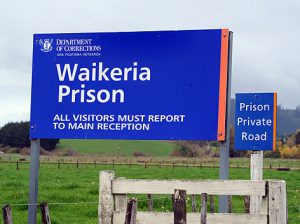Open Letter to Government: a Call to Stop Prison Building
(See the names of the signatories at the bottom of the page)
We are criminal justice researchers calling on the government to stop the build of a new prison at Waikeria. The proposal to spend a billion dollars on this venture is at odds with its explicit commitment to reduce prison numbers. To allow time for a national conversation about alternatives, we propose a moratorium on all new prison construction.

Never before have so many New Zealanders been incarcerated. Since 1986, the number of prisoners has swelled from 2,700 to 10,700, a four-fold increase. This puts us out of step with the rest of the world. While our crime rates are broadly similar to other countries in the OECD, our rate of 220 prisoners per 100,000 population is well above the OECD average.
The rapid expansion of our prisons disregards the overwhelming evidence that people sent to prison are more likely to re-offend than people with similar offending given community sentences. Contrary to the official goal of “correctionsâ€, prisons foster criminality and often intensify the problems they are designed to address.
The design of the proposed prison at Waikeria also ignores international best practice. The new facility would ultimately hold up to 3000 people, making it triple the size of any other prison in our country. Prisons on this scale are extremely rare around the world, despite being relatively cost-efficient, because it becomes impossible to humanely manage thousands of people confined in the same institution. Prisons that focus on rehabilitation are small, allowing for close relationships between staff and prisoners. In Scandinavia, capacity is typically between 50 and 100 people.
“Contrary to the official goal of ‘corrections’, prisons foster criminality and often intensify the problems they are designed to address.”
Prisons designed for rehabilitation also keep prisoners close to their home networks of support, encouraging family and community integration. This is the core principle of Corrections’ own Regional Prisons Policy. Yet the proposed build at Waikeria would locate prisoners from Auckland and Hamilton deep in rural Waikato, 16km south of Te Awamutu, leaving them socially isolated and severing relationships with the outside world.

The Waikeria build will undermine Prime Minister Ardern’s Waitangi Day commitments and intensify the mass imprisonment of MÄori. Our criminal justice institutions were brought to the country from outside in a process of colonisation, and were used to advance the dispossession of tangata whenua. Today, MÄori make up 50 percent of male and 62 percent of women prisoners, despite being only 14 percent of the general population. This is a symptom of long-term inequalities and the destructive role of the state in too many MÄori communities, including the historical removal of MÄori children into abusive state care. The more our prison system grows, the more it becomes an engine of inequality. Those emerging from behind the walls bear the brunt of homelessness, unemployment, family break-up, and exacerbation of mental and physical health problems. Their children are more likely to drop behind in school and, later, to become prisoners themselves.
“Prisons that focus on rehabilitation are small, allowing for close relationships between staff and prisoners. In Scandinavia, capacity is typically between 50 and 100 people.”
Given these negative consequences, we are concerned that Ministers have stated there is no choice but to build the prison. This is not true. The same policy levers that were used to expand prison populations in recent times are available to reduce them. The 2013 Bail Amendment Act rapidly increased pre-trial detention, doubling the number of people held on remand. Likewise, the 2002 amendment to the Parole Act closed down access to early release so people are serving much longer in prison. Reversing these changes in legislation could quickly ease overcrowding and remove the need for new prison building.
Reducing prison numbers through bail or parole reform will take political will and leadership. Yet there is nothing radical about this approach: it would simply mean returning to some measure of what is normal in our own history and in most other countries around the world.
“Reducing prison numbers through bail or parole reform will take political will and leadership.”
Now is the time for innovation and a search for alternatives, not more prison building. We need an informed debate about the future of criminal justice and interventions that can promote community safety, meet the needs of victims, and help people behind bars rehabilitate. We should be wary of alternatives that may expand a criminal justice system already operating on a historically unprecedented scale.
We call on Ministers to stop the prison build at Waikeria. We support a public commitment from the government to ban all new prison construction, allowing time for a national conversation over the best methods to achieve a fairer, safer society.
Signed by the following 32 academics:
Dr. Lynzi Armstrong, Lecturer in Criminology, Victoria University of Wellington
Dr. Trevor Bradley, Senior Lecturer in Criminology, Victoria University of Wellington
Professor of Law, Warren Brookbanks, Auckland University of Technology
Dr. John Buttle, Senior Lecturer in Criminology, Auckland University of Technology
Dr. Antje Deckert, Senior Lecturer in Criminology, Auckland University of Technology
Dr. Russil Durrant, Senior Lecturer in Criminology, Victoria University of Wellington
Dr. Fairleigh Gilmour, Lecturer in Criminology and Gender Studies, University of Otago
Dr. Fiona Hutton, Senior Lecturer in Criminology, Victoria University of Wellington
Dr. Moana Jackson, Director, Nga Kaiwhakamarama I Nga Ture
Associate Professor of Criminology, Jan Jordan, Victoria University of Wellington
Ti Lamusse, Research Coordinator, People Against Prisons Aotearoa
Dr. Nessa Lynch, Senior Lecturer in Law, Victoria University of Wellington
Professor of Criminology, Simon Mackenzie, Victoria University of Wellington
Professor of Restorative Justice, Chris Marshall, Victoria University of Wellington
Dr. Liam Martin, Lecturer in Criminology, Victoria University of Wellington
Professor of Indigenous Studies, Tracey McIntosh, University of Auckland
Dr. Alice Mills, Senior Lecturer in Criminology, University of Auckland
Dr. Sarah Monod de Froideville, Lecturer in Criminology, Victoria University of Wellington
Dr. Tom Noakes-Duncan, Lecturer in Restorative Justice, Victoria University of Wellington
Associate Professor of Criminology, James Oleson, University of Auckland
Dr. Deborah Platts-Fowler, Lecturer in Criminology, Victoria University of Wellington
Professor of Criminology, John Pratt, Victoria University of Wellington
Dr. Khylee Quince, Senior Lecturer in Law, Auckland University of Technology
Dr. Carisa Showden, Senior Lecturer in Sociology, University of Auckland
Julia Spelman, Board Chair, JustSpeak
Associate Professor of Criminology, Elizabeth Stanley, Victoria University of Wellington
Dr. Rebecca Stringer, Senior Lecturer in Criminology and Gender Studies, University of Otago
Associate Professor of Criminology, Tamasailau Suaalii-Sauni, University of Auckland
Dr. Juan Tauri, Lecturer in Criminology, University of Wollongong
Associate Professor of Law, Yvette Tinsley, Victoria University of Wellington
Professor of Law, Julia Tolmie, University of Auckland
Dr. Laumua Tunufa’I, Lecturer in Criminology, Auckland University of Technology
Dr. Robert Webb, Senior Lecturer in Criminology, University of Auckland
This letter was originally published in the New Zealand Herald on 22 February in a story under this headline: Andrew Little: ‘Longer sentences, more prisoners – it doesn’t work and it has to stop’. The letter is copied in its entirety.
